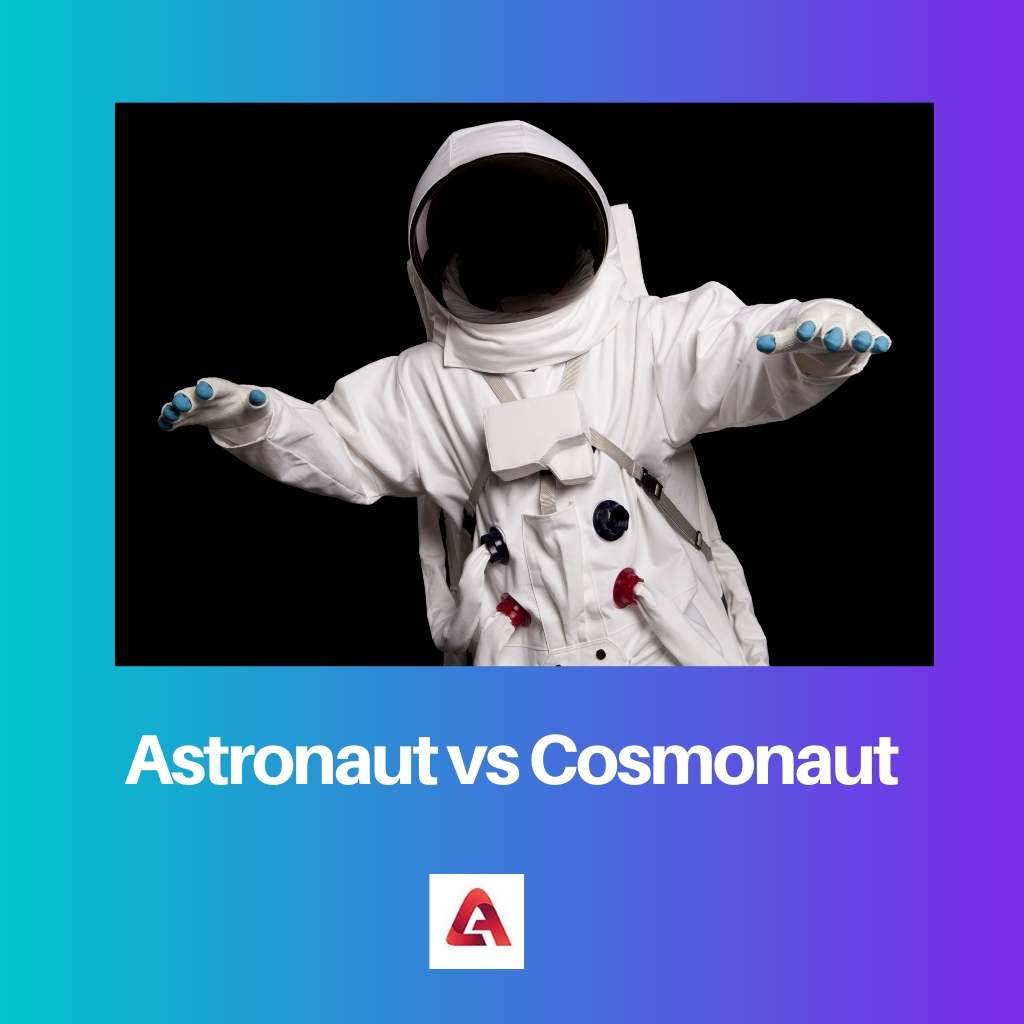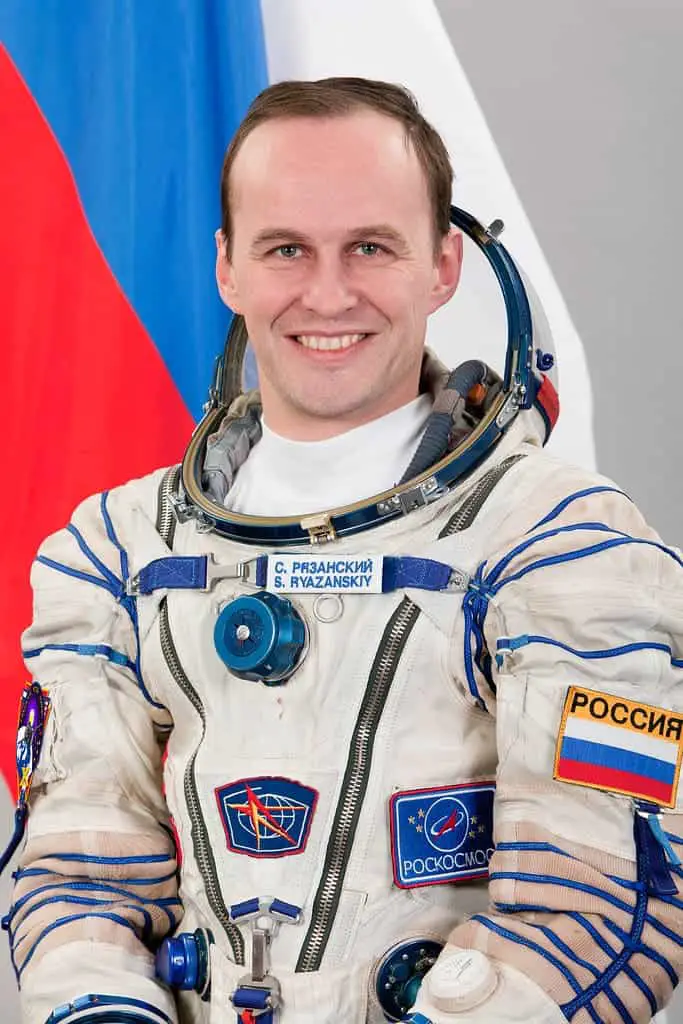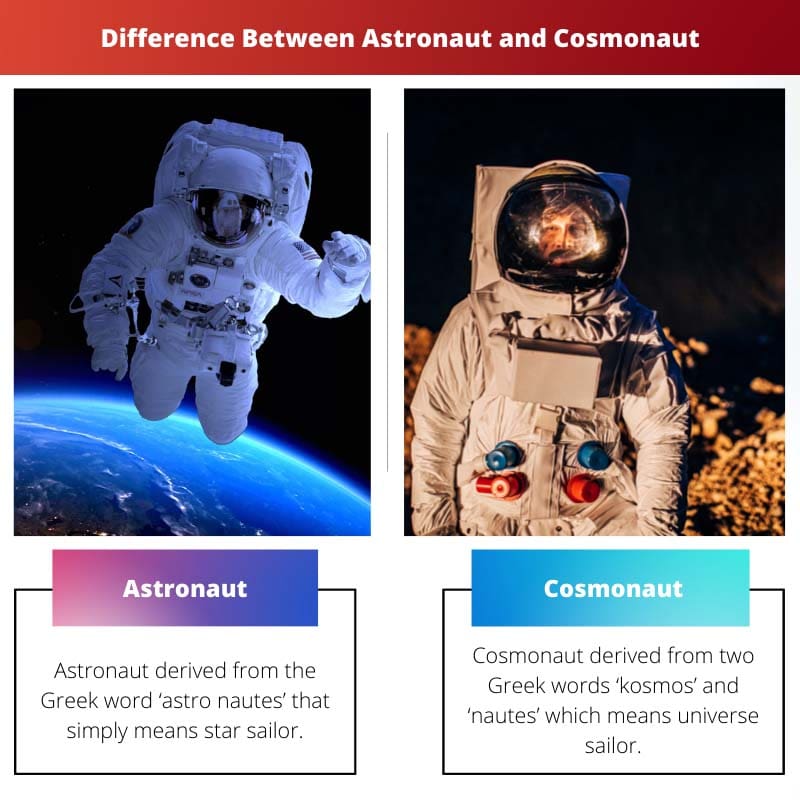While learning or talking about the universe, the major term that hits our head is an astronaut. People sometimes resemble astronauts with cosmonauts, but this is not true.
These two terms are used for people trained by different agencies. American space-related agencies train astronauts, while Russian agencies train cosmonauts.
Key Takeaways
- Astronauts are space travellers trained and employed by the United States or its partner space agencies, such as ESA, JAXA, or CSA.
- Cosmonauts are space travellers trained and employed by Russia or the former Soviet Union.
- Both astronauts and cosmonauts undergo extensive training and perform similar tasks, but the distinction lies in their respective countries of origin and affiliations.
Astronaut vs Cosmonaut
The difference between an astronaut and a cosmonaut is that astronaut is used for those individuals who explore space and the universe and mainly from countries like Canada, Europe, and the United States. American-based space agencies, including NASA, CSA, etc train these people. On the contrary, the cosmonaut term is used for those space invaders that the Russian-based space agency trains.

An astronaut is an individual or a person that explores space or travels in the spacecraft. Before heading towards the spacecraft, the astronauts must undergo strict training to learn how to survive effectively in space.
Various tests are done to ensure the person is physically fit to explore outer space.
Cosmonaut is derived from the Greek word that means ‘Universe Sailor.’ This term is specifically used for the Russian individuals who explore space and are trained by Russian-based space agencies. Russia has a long history related to the space lift.
Comparison Table
| Parameters of Comparison | Astronaut | Cosmonaut |
|---|---|---|
| Meaning | Astronaut derived from the Greek word ‘astro nautes’ that simply means star sailor | Cosmonaut derived from two Greek words ‘kosmos’ and ‘nautes’ which means universe sailor |
| Eligibility | Must have a master degree in any of the Stem fields. Must have professional experience of a minimum of two years or jet aircraft pilot experience for minimum of 1,000 hours. The individual should pass or qualify for the astronaut physical test of NASA. | Must be a citizen of Russia and would be able to speak English and Russian fluently. The age of the person should not be more than 35 years. He or she should not suffer from any serious health condition and should possess relevant experience of at least five years. |
| Origin | It includes individuals from Canada, Europe, Japan, and the United States | It includes individuals from Russia only |
| Training | Astronauts are trained by America based space agencies | Cosmonauts are trained by Russia based space agencies |
| Are they Same? | Astronauts are considered as cosmonaut when they leave the Earth’s atmosphere | Cosmonaut never called Astronaut |
What is Astronaut?
Astronaut is derived from the Greek word ‘astro nautes,’ which means star sailor. This term is used for those individuals who sail or explore space. Astronauts use spacecraft to travel to outer space.
In the spacecraft, there would be a team of a few people that have different responsibilities ranging from commander to pilot. All of these people are trained strictly, and various tests have been made to check their eligibility.
Astronauts are those individuals that are trained by the space agencies of the United States. These individuals possess tremendous communication and leadership skills.
To become an astronaut, one should consider the requirement or the eligibility aspect described below.
- The individual must have a master’s degree in any of the stem fields, which can be physical science, engineering, biological science, or other relevant degrees.
- Must have professional experience of a minimum of two years or jet aircraft pilot experience for a minimum of 1,000 hours
- The individual should pass or qualify for the astronaut physical test of NASA.

What is Cosmonaut?
Cosmonaut is derived from two Greek words, ‘kosmos’ and ‘nautes’, which means universe sailor. Any individual who visits or explores space and is trained by Russian-based space agency is called a cosmonaut.
The Russian space agency had a golden history of making records based on spaceflight.
To become a cosmonaut, the individual must be a citizen of Russia and would be able to speak English and Russian fluently. The age of the person should not be more than 35 years.
He or she should not suffer from any serious health condition and should possess relevant experience of at least five years.

Main Differences Between Astronaut and Cosmonaut
- Astronauts and cosmonauts are used for those individuals who explore space. Astronaut is derived from the Greek word ‘astro nautes,’ which simply means star sailor. In contrast, Cosmonaut is derived from two Greek words, ‘kosmos’ and ‘nautes,’ which means universe sailor.
- Different agencies train astronauts and cosmonauts, and hence they have different eligibility criteria. To become an astronaut, the person must have master’s degree in any of the Stem fields. Must have professional experience of a minimum of two years or jet aircraft pilot experience for a minimum of 1,000 hours. The individual should pass or qualify for the astronaut physical test of NASA. On the contrary, for a cosmonaut, the individual must be a citizen of Russia and would be able to speak English and Russian fluently. The age of the person should not be more than 35 years. He or she should not suffer from any serious health condition and should possess relevant experience of at least five years.
- Astronauts and cosmonauts are people that belong to different parts of the world and have a common interest in researching about the universe and space. Astronauts include individuals from Canada, Europe, Japan, and the United States. On the contrary, Cosmonauts include individuals from Russia only.
- America-based space agencies train astronauts, while Russia-based space agencies train Cosmonauts on the other side.
- Astronauts and cosmonauts have various similarities but are also different in several criteria. Astronauts are gradually considered as cosmonauts when they leave the Earth’s atmosphere, but it is not applicable to cosmonauts.

- https://www.sciencedirect.com/science/article/pii/0094576594900450
- https://www.nature.com/articles/s41598-019-44858-0

Hmm, interesting topic. I really wonder where an alien from Mars would fit into this?
such an interesting and informative comparison!
Exactly, Vicky! Great and informative article!
This is a great read! The explanation is so clear and concise, it clears out any doubts about the subject.
Absolutely agree, Gadams! It really explains everything in a very simple and easy-to-understand way.
It’s fascinating to learn about these subtle yet significant differences!
Yes, it’s so interesting to delve into this topic!
I appreciate the historical context included in the post. Understanding the origin of these terms is enlightening!
Absolutely, Morris Alfie! The historical context adds so much value to this piece.
The comparison table makes it easy to understand the variations. Interesting read!
I completely agree with you, Anna! The table really simplifies the differences.